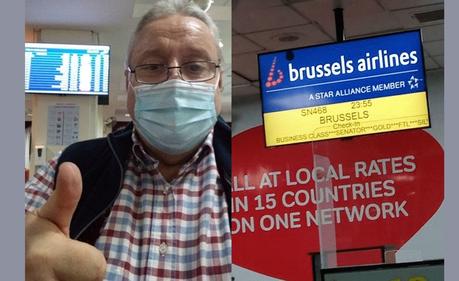
Posted 24th October 2020. Republished with the permission of the author.
Wolfgang writes:
We all look back at the days when one could book a ticket, at the airline, with a travel agent or do it online, pay and proceed to Entebbe, go through the - albeit dreaded - security checkpoints, check in, pass immigration and wait for the flight to be called for boarding.
When Uganda's main international aviation gateway finally opened on the 01st of October, months after our neighbours for that matter, had new protocols and operating procedure been introduced, adding more logistical requirements on wannabe travelers intent to leave the country by air.
First, and key to travel, is the required COVID19 negative test, which must be carried out within 72 hours before departure and notable does the clock begin to tick when the test is conducted, NOT when the results are released. It has been established that travelers have been barred from entering the airport after falling foul of these time limits.
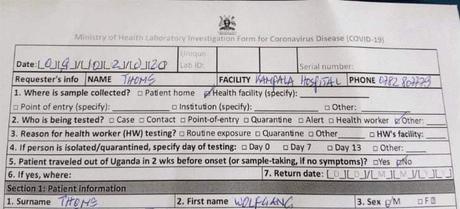 COVID test form. Uganda 2020 PHOTO ATCNews.org
COVID test form. Uganda 2020 PHOTO ATCNews.org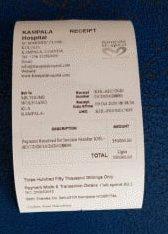 COVID test receipt. Uganda 2020 PHOTO ATCNews.org
COVID test receipt. Uganda 2020 PHOTO ATCNews.org
While a range of facilities in Kampala, Entebbe and of late also Mbarara are able to take the test swabs, do most then send the vials to an official laboratory where the actual test is carried out.
Cost, as reported on ATCNews before, varies, as does the time frame within which the results are transmitted - which can take anywhere between 6 to 10 hours to two days. The need for speed does influence the cost of course and the faster the results are needed the more a traveler has to pay.
That hurdle taken, flight booking made, paid for and e-ticket issued, can packing then commence. Most airlines restrict the amount of cabin baggage to reduce the time needed to stow it away and reduce potential contact points for passengers and crew and travelers should more strictly observe these rules today than was the case in the past. It has been mentioned that both checked bags and cabin bags would be sanitized - at least the handles - but no evidence was seen to that effect when checking in at Entebbe.
I had opted to use the NAS - formerly ENHAS - Pearl Assist service, available for departing and arriving passengers, to ease the process of navigating through the various security and health check points before reaching the check in counters, but the service extends beyond that through immigration, into the lounge and then to the point of boarding.
First was my test result checked and the bar code scanned - from my phone, no hard copies are required - before I could proceed to the terminal entrance. There, as before, are passports looked at as are tickets following which entrance into the departure terminal is granted.
The immediate entrance security check is then conducted as was the case before, of all bags as well as the personal scan and when passed can one then proceed to the airline's check in counter.
There again, are passport, ticket and yellow fever certificate checked before one is actually able to proceed to the counter itself. Plexiglass shields keep the distance between airline and handling agency staff and passenger.
The Brussels Airlines staff, as usual, were at their friendliest best, not having seen me for nearly 9 months since my last flight with them, and with my seat prebooked were the bags swiftly labelled and tagged before beginning their own journey on the baggage band into the loading area at ground level.
Next came immigration, the desks equally upgraded with added safety measures in the form of plexiglass shields. The staff were wearing masks and gloves while handling the passport and after I had scanned my finger prints I used my own sanitizer to clean my hands.
Next then came another new feature which needs to be mentioned.
In the past were boarding security checks carried out at every gate - there are four in use right now at Entebbe International Airport - but now a single departure area entrance point check has been installed, just behind the main duty free shops.
A second such checkpoint has been installed just at the door of the Government VIP Lounge, covering all entrances to the main departure area and ensuring that access to the boarding gate is now less congested, improving the traffic flow considerably.
This single access checkpoint is something ATCNews has repeatedly suggested in the past, as this feature had been introduced at other regional and international airports, but it took the pandemic to finally get this done, and well done for that matter. Better late than never ...
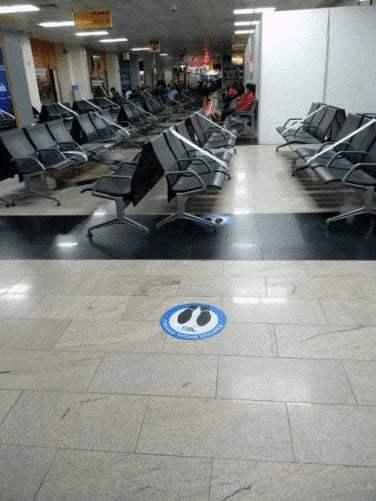 The remodelled main departure waiting area ensures physical distancing with signs on the floor and spacing on the seats. Entebbe Airport, Uganda 2020 PHOTO ATCNews.org
The remodelled main departure waiting area ensures physical distancing with signs on the floor and spacing on the seats. Entebbe Airport, Uganda 2020 PHOTO ATCNews.org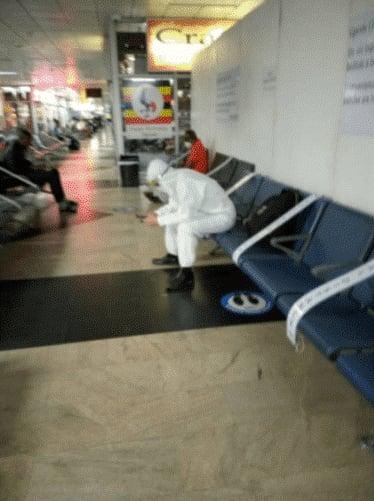 Also seen here is a traveler whose outfit reminded me of the proverbial overkill
Also seen here is a traveler whose outfit reminded me of the proverbial overkill
Man wearing PPE. Entebbe Airport, Uganda 2020 PHOTO ATCNews.org
My next step of the journey was the use of the Premium Lounge in Entebbe, where again added safety measures had been put into place, including spaced seating. My Pearl Assist service member Robert delivered me to the lounge and escorted me later to the gate for boarding. His shift leaders Carol, who after introducing herself then handed over to Christine, both kept checking on progress, so no passenger booking this service will feel left alone at any stage from arrival at the airport to the point of boarding their aircraft.
Service at the lounge remains friendly but self service is no longer possible as all snacks and drinks MUST be served by staff, who are properly attired with gloves, masks and head shields. Guests can only touch their food and drinks once delivered to their tables, again in line with global health and safety protocols.
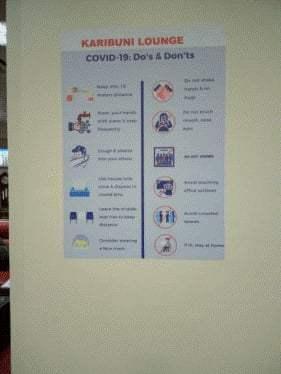 COVID sign. VIP Lounge. Entebbe Airport, Uganda 2020 PHOTO ATCNews.org
COVID sign. VIP Lounge. Entebbe Airport, Uganda 2020 PHOTO ATCNews.org
The final stage before departure was boarding and as the incoming aircraft from Kigali had landed 25 minutes early was boarding equally called early.
The Pearl Assist service was again at hand, ensured the use of priority boarding and then bid me farewell as Brussels Airlines staff took over. After a final check on my boarding pass and passport was I guided to the aircraft, an Airbus A330-300, for my nonstop flight to Brussels.As always when I travel directly to Europe I use Brussels Airlines for my flight which I already reviewed on TripAdvisor though part 2 of this narrative too will reflect on my experience.
Details of this part of my journey, covering the ' New Normal' inflight service, my arrival experience in Brussels and my subsequent onward journey to Germany, will be covered in part 2 of this narrative.
In closing, compliments to the Uganda Civil Aviation Authority for putting effective measures into place to make the flow from arrival to boarding somewhat more efficient compared to the past.
When it rains challenges remain of course to reach the departure level from the parking / drop off area but construction of the new terminal is advancing and that eternal problem - to remain relatively dry when it pours - will then hopefully be a thing of the past.
Staff, from aviation security to health personnel, were markedly more courteous and friendly, perhaps reminded by the 7 months grounding that it is travelers which keep them employed and who deserve a friendly disposition at all times and at all locations.
You can read the original article here on ATCNews.org
Wolfgang is a prolific writer and blogger at ATC (Aviation, Tourism and Conservation) News. He is an aviation expert and has worked at a strategic level in tourism across East Africa for over four decades. He posts daily #COVID19 updates at 6 am and 6 pm. Read The future of travel in East Africa - Diary of a Muzungu's interview with Prof Thome.
When can I travel to Uganda? post-lockdown FAQs based on Qs and As with travelers. September 2020
Now is the time to take precautions! US Embassy Kampala August 2020
Coronavirus survival tips: how to work from home based on a decade working from home in Uganda. March 2020
Bracing ourselves for Coronavirus in Uganda comprehensive health advice. Published March 2020 and updated regularly.

